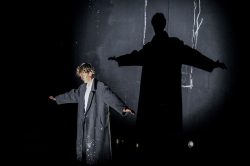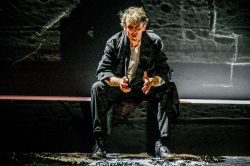 WHEN Laurence Boswell decided to move on after seven-plus highly successful years as artistic director of Bath’s Ustinov Studio, it was a little like Manchester United searching for a replacement for their legendary manager Sir Alex Ferguson. Unlike United, who have had seven new leaders in the nine years since Sir Alex retired, the Ustinov immediately found the ideal replacement in Deborah Warner.
WHEN Laurence Boswell decided to move on after seven-plus highly successful years as artistic director of Bath’s Ustinov Studio, it was a little like Manchester United searching for a replacement for their legendary manager Sir Alex Ferguson. Unlike United, who have had seven new leaders in the nine years since Sir Alex retired, the Ustinov immediately found the ideal replacement in Deborah Warner.
In her three year tenure, which unfortunately draws to a conclusion at the end of this season, Deborah seamlessly charged direction, introducing opera, dance and song leading the way through internationally-acclaimed programmes.
The latest in this long list of successes is Franz Schubert’s 24-song cycle Winterreise, based on poems by Wilhelm Muller, which, after it finishes its run this, week returns to the Ustinov for three days from 8th to 10th September. Tickets are as difficult to come by as hens’ teeth, as they should be for this brilliantly presented, sombre look at a man rejected in love, facing what he sees as his own imminent death. It reflects the mood of the composer who died at the tragically early age of 31, just a few weeks after completing the work.
For an hour and ten minutes, with scarcely a moment’s rest, internationally renowned tenor Ian Bostridge takes us through the life of a man for whom life has lost its meaning with the harshness of winter upon him. Only in the last moments of the journey, when the gloom and bleakness of Justin Nardella’s set, given subtle changes of emphases by Jean Kalman’s lighting plot, is thrown open as Ian Bostridge opens the Ustinov’s side windows to let in the warmth of the evening sun, does a ray of hope for the future emerge.
 To further emphasise this change of direction, director Deborah Warner underpins almost every line of the lyrics, manoeuvring Ian Bostridge around the two-tiered setting in and out of a tray of snow and another of sharp stones, filling the audiences’ minds with visual effects to match the words and music. And whether lying on his back or standing tall and railing against what he sees as the unfair hand God has dealt him, Ian Bostridge marries his facial and body movements so tightly to his emotions that even without the translation [it is sung in German] unobtrusively placed towards the rear of the stage, you could follow his every thought, belief and desire.
To further emphasise this change of direction, director Deborah Warner underpins almost every line of the lyrics, manoeuvring Ian Bostridge around the two-tiered setting in and out of a tray of snow and another of sharp stones, filling the audiences’ minds with visual effects to match the words and music. And whether lying on his back or standing tall and railing against what he sees as the unfair hand God has dealt him, Ian Bostridge marries his facial and body movements so tightly to his emotions that even without the translation [it is sung in German] unobtrusively placed towards the rear of the stage, you could follow his every thought, belief and desire.
There was a now more-or-less forgotten actor named Jerry Desmonde whose work as a ‘straight man’ enhanced enormously the careers of comedians Sid Field and Norman Wisdom. In the same way pianist Julius Drake, with perfect timing and changes of tone from full orchestral to pianissimo, formed an ideal partnership with Ian Bostridge. Between them they make this a memorable musical experience for any audience.
And what of the mysterious, sad, elderly gentleman who sat front centre stage as the audience assembled, and silently stage right throughout? It was he as the neglected Hurdy Gurdy Man, representing the world’s downtrodden masses, who when reappearing silently changes the final course of the journey making the wanderer take a new look at humanity and what life may or may not still have to offer him.
GRP
Photographs by Claire Egan